German shares plunge almost 10%published at 08:07 British Summer Time 7 AprilBreaking
Germany's Dax share index has plunged nearly 10% at the start of trade, while the UK's FTSE 100 is now down nearly 6%.
Donald Trump says he has no plans to pause global tariffs as the world's stock markets experience another turbulent day
Speaking to reporters inside the Oval Office, Trump reiterates that he'll impose an extra 50% tariff on Beijing if it doesn't withdraw its retaliatory levy by midday tomorrow
If imposed, it could leave some US companies bringing in certain goods from China facing a 104% tax
It comes as Europe's biggest stock markets - including London's FTSE 100 - have all closed over 4% down
US markets - which saw big swings throughout the day - got a bit of a breather, as the tech-heavy Nasdaq managed to close in positive territory
The Dow Jones closed down 0.91%, while in its third consecutive day of losses, the S&P 500 fell 0.23%
Watch: Trump says US 'not looking into' pausing tariffs
Edited by Johanna Chisholm
Germany's Dax share index has plunged nearly 10% at the start of trade, while the UK's FTSE 100 is now down nearly 6%.
Trading started on the London Stock Exchange a few moments ago and the FTSE 100 index has opened down 2.4%.

 Dharshini David
Dharshini David
Deputy economics editor
Wall Street is not Main Street, and shifts in markets do not, for the main part, reflect what’s happening in the real world at that moment.
But clouds are gathering over economic prospects - fast - as the impact of President Trump’s universal tariffs filter through the real world.
Movement of stocks, oil prices, and so on, are largely driven by sentiment and speculation, predictions of what may happen.
Currently, it is fear rather than fundamentals that are largely driving share prices - fears of a recession later in this year or next. The markets have plunged as traders have adjusted expectations - reality hitting that these tariffs may not be temporary - and the risk of more countries acting in kind.
It’s not just investors but world leaders gambling this week, deliberating whether restraint or retaliate is the best policy. Their actions will shape global growth and inflation.
Some economists put the US’s chances of entering recession as close to 50-50, and some reckon the global economy may face a similar risk.
Between them, China and America make close to half of global goods; the shockwaves will be felt far from their shores. But remember, even as markets glow red, the economic impact remains very uncertain.
All eyes will be on the European markets when trading starts at 08:00. The indications are they will open sharply lower, following the slump we’ve already seen in Asia.
Just a reminder that on Friday, the UK’s benchmark FTSE 100 share index sank nearly 5% - its worst day of trading since the start of the Covid pandemic in early 2020.
Banking shares saw some of the biggest losses on Friday and bank shares have seen hefty falls already in Asia today.
The FTSE 100 was down 7% over the week as a whole, and similar falls were seen on the German and French markets.
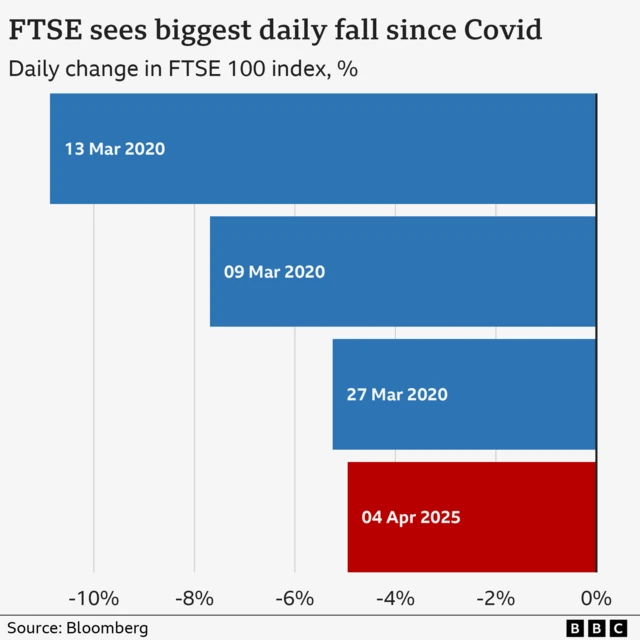
Friday's fall in the FTSE 100 was the biggest since the Covid era
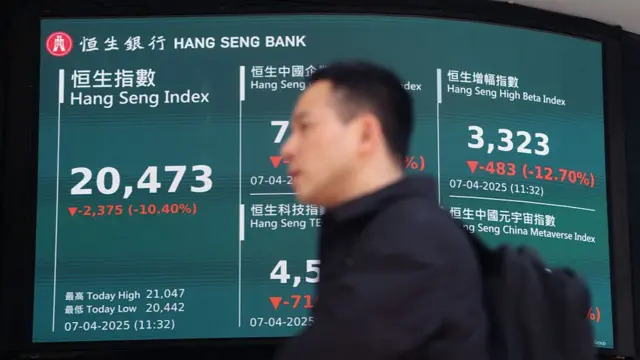 Image source, Getty Images
Image source, Getty ImagesA markets screen in Hong Kong earlier
Stock markets in Asia continue to fall on Monday - even since our last update less than an hour ago.
Hang Seng - Hong Kong's stock market index - is now down 12.9% today. On mainland China, the Shanghai Composite is down more than 8%.
In Hong Kong and Shanghai, it's the first day of trading since Thursday, having been closed on Friday for a public holiday.
 Mike Wendling
Mike Wendling
Reporting from Delta, Ohio
On a quick drive around the small Ohio town of Delta, you can spot nearly as many Trump flags as American stars-and-stripes banners.
This is Trump country - the Republican ticket easily won here in November's presidential election by a margin of almost two-to-one.
And while the markets are in turmoil following Trump's tariffs, plenty of people in Delta and hundreds of Midwestern towns like it still back the president's plans.
"I don't want people in other countries to suffer, I really don't," says Mary Miller, manager of the Delta Candy Emporium, which sits in the middle of the village's Main Street.
"But we need to have an even playing field."

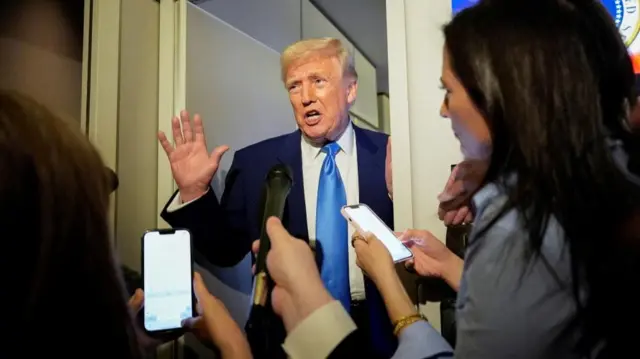 Image source, Reuters
Image source, ReutersThe US president speaking to reporters on Air Force One earlier
The indications are that stock markets in Europe and the US will open sharply lower when trading starts later.
Erik Hirsch, the co-chief executive of US private equity firm Hamilton Lane, which is responsible for more than $956bn worth of global assets, has just spoken to our colleagues on Radio 4's Today programme.
He says while investors are "clearly blaming" the US government for the falls, he thinks "a lot of people recognise that there are some serious trade imbalances, and something needs to be done to address that".
But he adds: "This [US] administration is attempting to eat the elephant in one bite, and so the markets are having a hard time sort of dealing with those gyrations.
"I think this is an example right now where there's just simply too many variables. And so right now, the markets are going to process this, and the markets are processing it by simply going down."
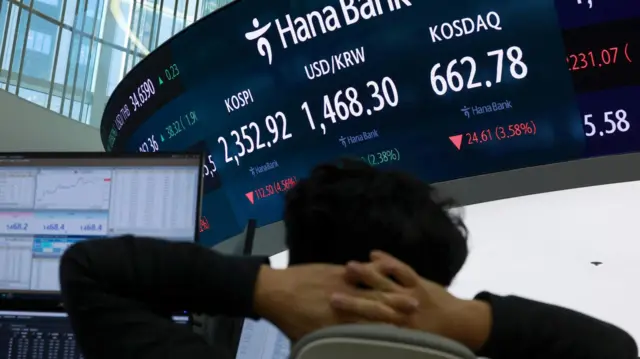 Image source, Yonhap
Image source, YonhapAsia's major stock markets have fallen across the board. Here's where things stand at the moment:
*closed on Friday for public holidays
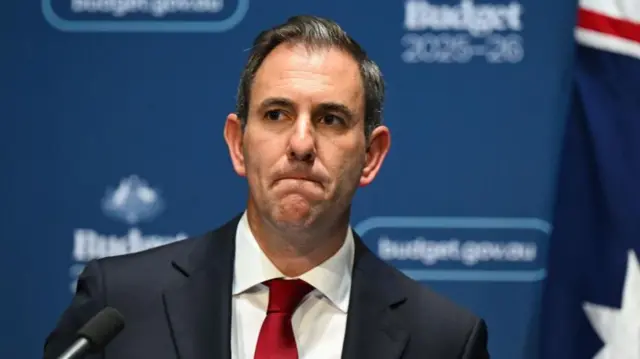 Image source, EPA
Image source, EPAAustralian Treasurer Jim Chalmers says they expect the US tariffs to have "manageable impacts" on the country's economy.
"But we still do expect Australian GDP to take a hit and we expect there to be an impact on prices here as well," he told a press conference today.
"Our Treasury is not expecting the Australian economy to go backwards. In fact, what we are forecasting... is for growth to continue to gather pace."
Billions of dollars were wiped off the Australian Securities Exchange within minutes of opening this morning, and the Australian dollar fell to its lowest against the US dollar since the pandemic.
Under Trump's plans, Australian goods entering the US now face a 10% tariff. Other countries, including the EU, China, and many other Asian countries - face higher rates.
 Nikhil Inamdar
Nikhil Inamdar
BBC News, Mumbai
Indian markets have opened with sharp cuts, tracking the huge amount of nervousness among their Asian peers.
A bit of the rally the markets saw in March has evaporated in barely a few days, following Trump’s tariff announcements.
The turmoil will continue for a while and only positive trade negotiations will "help arrest the market slide", said analyst Arun Kejriwal.
Indian software companies, which report their quarterly earnings this week are seeing a massive selloff, with expectations that the US – their biggest market – could go into a recession, leading to lower tech spending.
The stock of Tata Motors – the company that owns Jaguar Land Rover – has also lost 10% in trade after JLR announced it will pause all shipments to the US while it assesses new trading terms after tariffs were imposed.
Trump’s actions are likely to affect India’s overall growth prospects. Many analysts have immediately lowered their GDP forecasts.
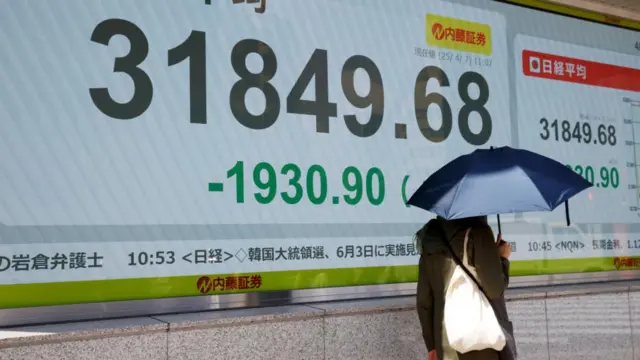 Image source, Reuters
Image source, ReutersGood morning to new readers joining our live coverage, as US tariffs continue to send shockwaves around the world.
Here's a quick recap of key developments in the past few hours:
Looking ahead, the London Stock Exchange is opening at 08:00 BST (07:00 GMT). Stay with us for all the latest news and analysis from our correspondents across the globe.
Goldman Sachs has raised its estimation of a US recession within 12 months to 45% - up from a previous estimate of 35% - as the bank lowered its US GDP growth forecast.
Several investment banks have revised their recession forecasts in the wake of Trump's tariff announcement. JPMorgan now sees a 60% chance of a US and global recession.
Indian shares were lower at the open on Monday, with the Nifty 50 and Sensex stock market indices falling by around 5%.
Shares of car manufacturer Tata Motors fell by 10%. Its subsidiary Jaguar Land Rover had announced over the weekend that it would "pause" all its shipments to the US as it works to "address the new trading terms" from tariffs.
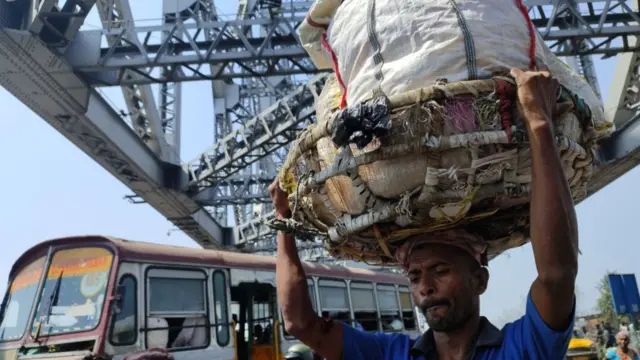 Image source, Getty Images
Image source, Getty ImagesMaura Fogarty
Asia Business Editor, Singapore
There is a little bit of catch-up this morning because Taiwan’s stock market was closed on Friday. Shares of chipmaker TSMC as well as of Foxconn fell near 10% - both companies make Apple’s iPhones.
Although chips are exempted from the sweeping tariffs unveiled by Trump last week, the island plays an important role in the string of locations around Asia which are involved in making electronic products sold around the world – products like smartphones, TVs and cars.
iPhones, for example, are assembled in China using chips made in Taiwan. And, it exports computers and many other electronic components to the US.
That’s one reason why Taiwan's President Lai Ching-te has said Taiwan would remove all tariffs on US imports to the island rather than impose retaliatory tariffs, and that Taiwanese companies will increase their investments in the US.
If you're just joining our live coverage of how US tariffs are affecting the world, let's get you up to speed:
We'll continue to bring you more updates as we get them - stay with us.
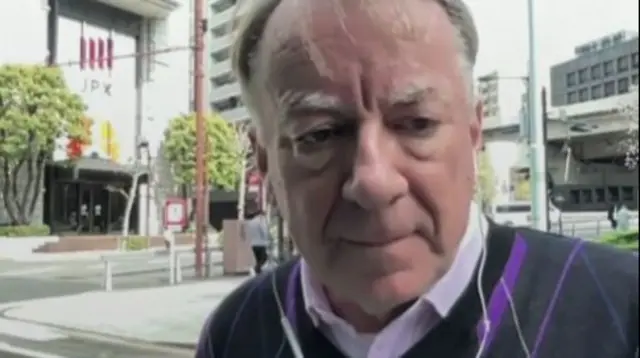
Let's bring you a bit more analysis from an expert.
We've just spoken to Neil Newman, head of Strategy at Atris Advisory Tokyo, Japan, where banking stocks, and the metal, mining and tech industries are "getting hit very hard".
He says the market is likely to recover, but a recession looms on the horizon.
"When you see markets fall like this you're probably going to snap back - which will probably come soon and will catch everybody out," he told the BBC's Business Today programme.
"The recession will probably knock around globally, until new trading relationships are sorted," he adds.
It's unclear how the situation will be weathered but, Newman expects to see major shifts in supply chains.
"America is a very important market, but it's not the only market in the world."
"There's already discussions between the Japanese, Chinese and South Koreans on trade, which hasn't happened in some considerable time."
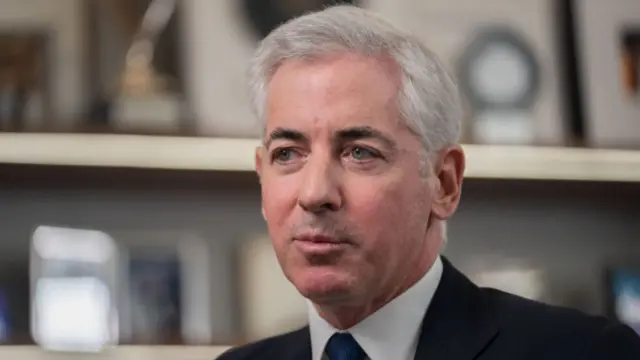 Image source, Getty Images
Image source, Getty ImagesHedge fund manager Bill Ackman has said Trump's tariffs could lead the world into a "economic nuclear winter" as he called for a 90-day pause on the taxes.
Ackman, who is one of Trump's most prominent Wall Street backers, said in a lengthy post on X , externalthat the president was losing the confidence of business leaders.
"The country is 100% behind the president on fixing a global system of tariffs that has disadvantaged the country. But, business is a confidence game and confidence depends on trust," Ackman said.
"The president has an opportunity to call a 90-day time out, negotiate and resolve unfair asymmetric tariff deals, and induce trillions of dollars of new investment in our country," he added.
If not, Ackman added that Trump was "in the process of destroying confidence in our country as a trading partner, as a place to do business, and as a market to invest capital".
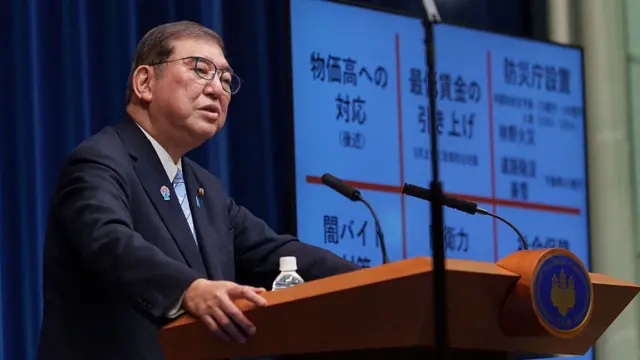 Image source, Getty Images
Image source, Getty ImagesJapan's Prime Minister Shigeru Ishiba
With just over 48 hours until some countries face steeper tariffs, Asian countries like Japan and South Korea are bracing for impact.
Japanese Prime Minister Shigeru Ishiba said on Monday that his government "must take all available means" to soften the economic blow from tariffs, including offering funding to local businesses.
South Korea's finance minister said the country is analysing the impact of tariffs, and will prepare support measures for "sectors with urgent needs".
Meanwhile, the chairman of the Taiwan stock exchange has also pledged to work with its financial regulator to roll out more policies to stabilise markets.
As well as a 10% "baseline" tariff already in place, the US will impose what the Trump administration describes as reciprocal tariffs on roughly 60 of the "worst offenders".
These will go into effect on 9 April.
Here are some key trading partners subject to these steeper rates. The figures given here will be the total tariffs inclusive of the baseline:
Here's the global "at-a-glance" picture with the full list of the affected countries.
 Mariko Oi
Mariko Oi
Asia Business Correspondent
In my 20 years of covering the Asian stock market, this is one of the biggest continuous market sell-off the region is experiencing.
Japan, South Korea, Australia are in a sea of red for a third day, while investors in China where the market was closed for a public holiday on Friday are experiencing what they described as an ugly Monday.
This shows that investors are increasingly concerned - not just the US economy - but about the prospect of the global economy falling into a recession.
It takes an enormous shock to trigger that, with the Covid pandemic and the global financial crisis being the most recent causes.
As global leaders continue their negotiations with Washington, they are also scrambling to support businesses that are directly affected by the tariffs.
Japan’s carmakers are one of the worst affected due to the 25% levy that Trump brought in for all imported vehicles into the US.
Banking shares are also hit hard with British banking giants such as HSBC and Standard Chartered falling by 10-15% today.